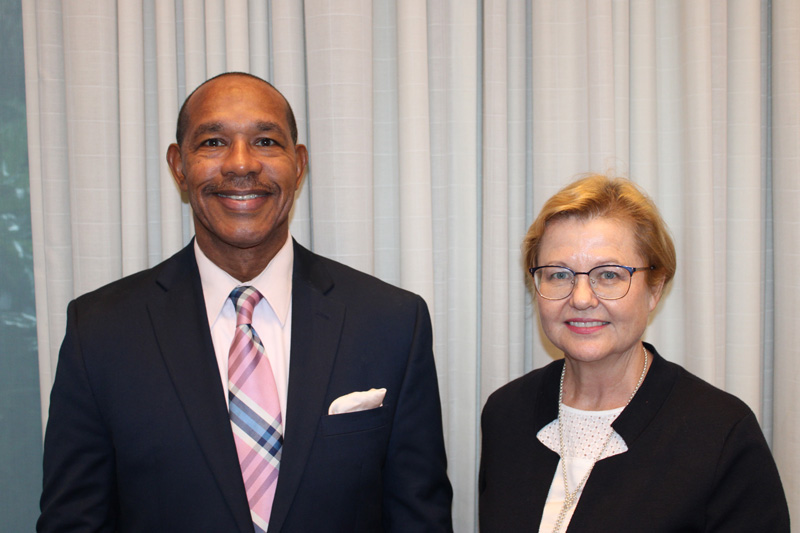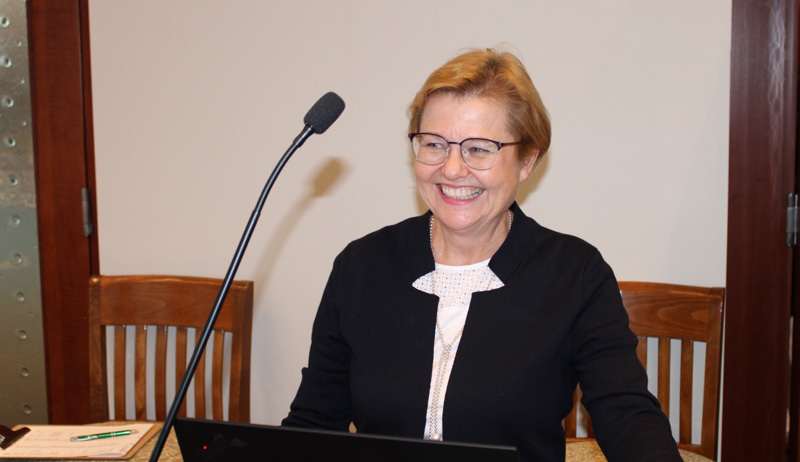Beck: Benefits Of Google’s New Subsea Cable
The landing of Google’s new subsea cable in Bermuda will “pave the way for the island to become a transatlantic digital hub, bringing multiple local benefits,” said the guest speaker at the Association of Bermuda International Companies’ [ABIC] annual general meeting.
A spokesperson said, “Fiona Beck, an adviser to Google and the former CEO of Southern Cross Cable Ltd., a Bermuda-based submarine cable company, said the project will bring infrastructure investment, jobs, improved connectivity, training opportunities and recurring regulatory revenue to the island.
“As a former director of the Bermuda Business Development Agency [BDA], Ms Beck was instrumental in crafting the island’s digital hub strategy, developing its legislative framework under the Submarine Communications Act 2020, and in establishing the relationship with Google.
Ms Beck with Wayne Smith, ABIC’s Executive Director
“Google’s Nuvem subsea cable will connect Portugal, Bermuda and the East Coast of the United States. With 95% of the world’s internet traffic transported via such cables, the subsea network is a critical part of the world’s digital infrastructure, Ms Beck said, at a time when data is an increasingly valuable commodity, and the adoption of artificial intelligence gathers momentum.”
“Think of how Atlanta is a hub for Delta Air Lines, with many travellers passing through to get from A to B,” Ms Beck said. “The vision is Bermuda can become the Atlanta hub for subsea cables in the Atlantic region.”
The spokesperson said, “Unlike the Pacific, which has established hubs like Hawaii, Guam and Fiji, the Atlantic lacks a centralised digital switch. Bermuda’s submarine cable corridor positions the island to fill this void. The framework provides pre-approved landing zones at Devonshire Bay and Annie’s Bay, cutting red tape and guaranteeing processing time for companies within 75 days.
“Ms Beck gave an example of how the island could serve as a ‘switch’ in the network. If a future cable were to be laid from South Africa to New York, for example, by coming through Bermuda it could link South Africa with Portugal too.
“Sea Grass Services Ltd., a subsidiary of Google, has paid $4.86 million to the Bermuda Land Development Corporation for a 262-year lease on a 5.9-acre side in Southside, St David’s, where it will build a circa 50,000-square-foot cable-landing station.”
Ms Beck at ABIC’s AGM
“Google is not putting up such a big building just for one cable,” Ms Beck said. “To be a switch and a pivot point, you need multiple cables. So, this station is designed for multiple cables.
“The wider BDA strategy is built around the idea that once a company like Google brings a cable here, others like Amazon, Facebook [Meta] and Microsoft are expected to follow. They are the content carriers and content managers, who are using the data and so they are the ones building submarine cables today.”
The spokesperson said, “Ms Beck challenged the perception that cable is an ‘old-school’ medium compared to satellite — in fact, data travels much faster via fibre-optic cable. In her experience with the Southern Cross cable, she has seen data travel from New Zealand to California in about 70 milliseconds — literally quicker than the blink of an eye.
“Nuvem will create tens of jobs in construction, marine work and station operations. More cables will bring more opportunities. But Ms Beck said the greatest impact would come from the consequent ‘multiplier effect’.”
“Think of Google coming here with the infrastructure as the printer,” she said. “The printer ink is where the money and opportunity are. It’s the small thing that creates bigger things through a ripple effect.
“What are the businesses that will develop as a result of having Google here? I couldn’t tell you, because who knows what kind of vision we may create over the next 10 years with AI and big data and other developments that may happen.”
The spokesperson said, “Ms Beck expects Google’s brand recognition to attract interest from young Bermudians, as the company considers educational and training opportunities on the island.
“Google is also committed to sustainability principles, she added. The new landing station, once full, would consume about three megawatts of electricity, she estimated, and the company would be seeking opportunities to source at some of its power needs from renewable sources.”
Ms Beck said she was working on additional subsea cable strategies: “There’s two or three other ones in the pipeline that I’m working with the BDA to promote, because there is a real opportunity here to build this into another pillar of economic activity for Bermuda.”
Read More About
Category: All, Business, News, technology





When Global Crossing tried to do this, decades ago. The PLP put a stop to it with their false morals. How will the PLP destroy this endeavor?
Think AC35 and SailGP.
The Americas Cup (AC35) was bad for Bermuda because the PLP Government were not in charge. SailGP, which is Americas Cup light, is good for Bermuda because the PLP Government profits from it.
SAIL GP was because Oracle lost the Americas cup and the winners wanted to move away for the Cat format (so I read). Sail GP was because of the Americas cup.
“Sail GP was because of the Americas cup”
Agreed. Which is why I say SailGP is Americas Cup light
You’re missing the part about the PLP being involved in both cases.
Keep trying though, maybe slow down and try to comprehend what it is you’re reading.
As I recall, the involvement of the PLP in AC35 was limited to lambasting the OBA for giving away millions to white billionaires.
I’m talking about their involvement in Global crossing and now Google.
What a deal for Google. $3,144 rent per year per acre for 262 years. Talk about giving away Bermuda for peanuts. Great negotiating skills by BLDC, not.
Follow the money because certain people involved in the process must be getting something out of this, such as six-figure advisory positions, consulting positions, or employment.
Why did no one negotiate free Internet for Bermuda in the deal?
Google wants its own cable(s), Nuvem. That’s interesting. But Bermuda households will not have free Internet in the deal. Did anyone even ask?
Landing Points
Annie’s Bay, Bermuda
Sines, Portugal
São Miguel, Portugal
Myrtle Beach, SC, United States
Looks like Myrtle Beach real estate will get a boost from a data center and lots of Google employees.
“Looks like Myrtle Beach real estate will get a boost from a data center and lots of Google employees.”
I doubt Bermuda has enough people with the proper skill set to host such a data centre, and our PLP Government is not going to just hand out work permits
There are more than enough qualified data center employees in Bermuda working for a few data centers. Google would swoop them up with higher salaries and better benefits. I know people at one major data center would jump ship in a heartbeat. If Google decided to offer hosting, I suspect many Bermuda customers would jump to Google once their existing contracts expired – government included. Google Internet security is far better than anything in Bermuda and as we have seen over and over, our ISPs are not effectively blocking (if even trying) hackers and scammers.
Employees and businesses moving to Google would naturally negatively impact our existing data centers, which would just fade away. Executives would be out of jobs with nowhere to go, and buildings and equipment would gather dust.
My comment on Myrtle Beach is that it is the US landing point for the cable, which makes it a perfect place for processing everything coming and going across the cable, hosting, etc.